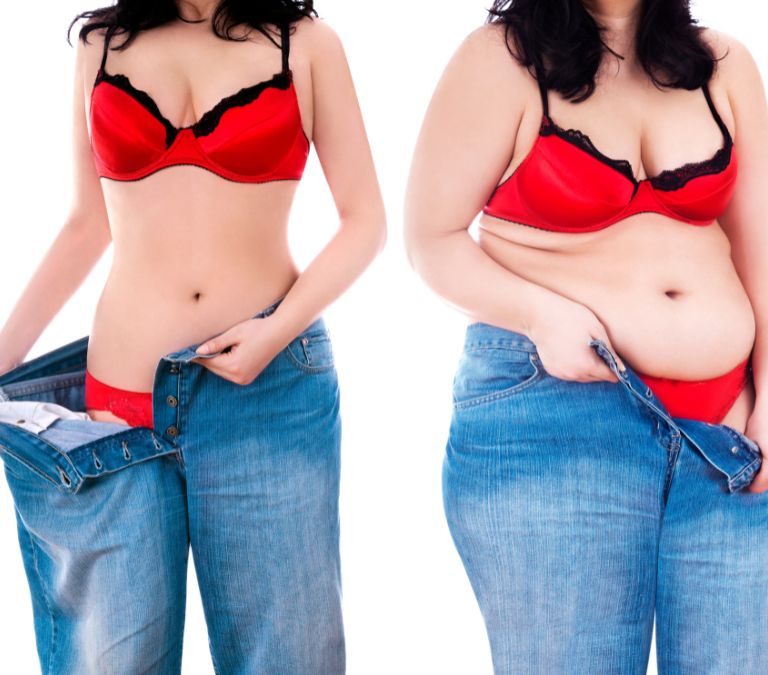Menopause is a stage in women where there is no longer production of the female reproductive hormones – estrogen and production. The menopause stage is marked by the absence of menstruation for 12 months and is often diagnosed as well by monitoring the level of follicle-stimulating hormone (often elevated) and estradiol (estrogen) (often lowered).
The menopause stage in women comes with many changes ranging from a drop in their sexual drive and general libido to mood swings, unexplained weight gain, insomnia, hot flashes, vaginal dryness, and thinning of the skin due to loss of elasticity.
Menopausal women have been identified to be at a high risk of weight gain. This weight gain has been associated with progressive loss of ovarian function due to aging, resulting in low estrogen levels in the blood.
Studies have shown that estrogen helps maintain good physical activities and improve metabolism. These studies explain the relationship between lowered estrogen levels and the sudden spike in body weight, especially in menopausal women, as the reduction in estrogen levels and the accompanying decline in physical activities tend to cause a decrease in metabolic rates, which invariably lead to weight gain.
Also, studies have proven that estrogen and leptin are invariably proportional; that is, as the levels of estrogen decrease during menopause, leptin level increases; this further contributes to the weight gain as menopausal women tend to eat so much yet will not feel full.
Another factor that can cause the disordered feeding habit in women in the menopausal stage is the need to make up for the psychological stress caused by the sudden change in the chronological clock. So, some women keep busy and manage the psychological and physical stress accompanying menopause with uncontrolled eating – all contributing to the continuous spike in their body weights.
Uncontrolled weight gain in menopausal women would predispose them to the following diseases.
- Cardiovascular diseases – increased weight predisposes one to cardiovascular diseases ranging from irregular heart rhythm to heart failure and cardiac arrest, usually linked to increased blood fat (high-density lipoproteins, low-density lipoprotein cholesterol, triglycerides) and blood sugar level.
- High Blood Pressure – is the flow of blood with great force through the blood vessels generating great pressure, which usually damages the blood vessels, trains the heart, and will lead to stroke and other cardiovascular diseases.
- Diabetes mellitus – is a condition that occurs when the blood sugar (glucose) is too high, leading to other diseases such as heart diseases, kidney problems, etc. studies have shown that 80% of people with type II diabetes (diabetes mellitus) are overweight.
- Osteoarthritis – is one disease of the bone where pressures are placed on the joints and cartilage, resulting in pain and swelling. It is commonly linked with overweight and obesity.
- Sleep apnea – is a common sleep disorder where one’s breathing becomes irregular or absent. One factor that leads to this disorder is overweight.
- Stroke – is a disease condition when blood flow to the brain is cut off temporarily or permanently due to blockage of blood vessels taking blood to the brain. It is usually caused by HDL and LDL cholesterol in the blood, which are well associated with being overweight.
- Fatty liver – is a disease condition where there is the deposition of fats in the liver leading to severe liver damage, cirrhosis, and abrupt liver failure.
- Kidney diseases – this when the kidney(s) can no longer perform its normal function of ultra-filtration and selective re-absorption. This condition is often associated with obesity and being overweight.
- Breast cancer – research has proven that breast cancer and other cancers are closely associated with obesity and overweight.
Weight gain during menopause can also be associated with other age-related factors such as the following.
- Loss of muscle mass – can cause fewer muscles to be recruited during mild to strenuous exercise causing larger muscle mass to continuously be at rest – utilizing less energy.
- Choice of diet
It is now a fact that lowered estrogen level causes a decline in metabolic rate, which includes reduced uptake and utilization of sugars, thus the need to check certain foods intake as they worsen the menopausal weight gain condition.
Five (5) foods to avoid during menopause
The following are five (5) foods to avoid during menopause.
- Fatty foods/ meats
- Spicy Foods
- Alcohol
- Caffeine
- Refined carbohydrates
Fatty Foods and Meats

Fatty foods and meats are very high in saturated lipids/fats, which hike the blood cholesterol and triglycerides, invariably contributing to weight gain and other disease conditions such as heart diseases, stroke, diabetes, etc. Therefore, there is a need to reduce the intake of fatty foods like fried cookies, cakes, bacon, fatty meats, ice creams, whole milk, cheese, and some trans-fats found commonly in margarine and butter.
Spicy Foods
The intake of spicy foods during menopause has been associated with increased heat flushes, sweating, and anxiety (psychological stress). Studies have shown that certain groups of hot spicy foods trigger these conditions.
These spicy foods include jalapeῇos, cayenne, habanero, chili, black peppercorns, Carolina reaper pepper, etc. These spicy foods should be avoided or greatly minimized in menopausal women.
Alcohol
Alcohol has been noted to be one of the causes of the deposition of fats in the liver (Fatty liver). Thus, the intake should be kept moderate, especially in women in their menopause stage. Alcohol intake has also been associated with breast cancer, cardiovascular diseases in menopausal women, and hot flashes in many menopausal women.
Alcohol generally worsens menopause symptoms, and women who have attained menopause are advised to reduce their intake to just a glass or bottle a day if they must take it or stop it entirely.
Caffeine
Depending on caffeine for a quick energy boost has increased vasomotor symptoms such as night sweating and hot flashes in menopausal women.
Caffeine can be seen in certain foods, including soft drinks, juices, energy drinks, sweetened tea, flavored waters, and coffee – which often contain little or no nutrients but empty calories that help shoot the body weight.
According to the report, caffeine is also a vasoconstrictor, thus narrowing blood vessels – this also is not a good one for menopausal women as it adds to factors that increase blood pressure predisposing them to cardiovascular diseases and stroke. Therefore caffeine should be avoided by women during menopause.
Refined/Processed carbohydrates
Processed carbohydrates such as bread, pasta, rice, chips, etc., increase blood sugar levels, body weight, and other symptoms in menopausal women.
Refined carbohydrates also increase hot flashes, night sweating, other vasomotor symptoms, and invariable stress levels (anxiety disorder).
Some foods are handy in managing menopause and its symptoms; these foods are essential to managing weight gain, especially in the visceral regions.
These foods include but are limited to:-
- Green leafy vegetables
- Whole grains
- Bone meals
- Quality proteins
- Dairy products
Green leafy vegetables and fruits – such as broccoli, spinach, lettuce, berries, grapes, plums, green teas, etc.- contain lots of minerals and vitamins that are essential for the general functioning of the body and improved metabolism.
Recent reports have shown that consuming vegetables and fruits by menopausal women help reduce menopausal symptoms. Most of these leafy vegetables contain phytoestrogen that helps to boost estrogen levels.
Broccoli has been linked with managing breast cancer as it contains some essential phytochemicals that help increase the concentration of the special type of estrogen that fights breast cancer.
Strawberry has also been linked to lowered blood pressure in a study; grapes are wonderful in managing hot flashes and anxiety.
According to research, some of these veggies and fruits, such as red clovers and isoflavone supplements, also contain special groups of a compound called isoflavones – which manages hot flashes and increases the level of estradiol (estrogen).
The antioxidants in these fruits and vegetables are also essential in mopping up oxidants and free radicals in the body, thereby very handy in managing oxidative stress and leading to heart diseases and diabetes.
Cruciferous and leafy veggies are great in the supply of dietary fibers, which are great in regulating blood sugars and helping in bowel movements.
Whole grains – include whole-wheat bread, barley, rye, brown rice, oatmeal, cracked wheat, millet, buckwheat, etc.; and are known to be high in dietary fibers and vitamin Bs such as riboflavin, pantothenic acid, niacin, and thiamine.
Diets rich in whole grains reduce the risk of cardiovascular diseases, type 2 diabetes, stroke, and obesity.
Bone meals: Diets rich in calcium such as dried fruits, dairy products, broccoli, fish bones and some legumes, tofu, and fortified yogurt are known to greatly improve osteoarthritis by triggering the production of vitamin D, which is essential for the absorption of calcium and the subsequent strengthening of bones and improvement of joints movement in menopausal women.
Calcium has also been associated with improved heart functions as it is one of the ions transmitting electrical signals that coordinate heart functions.
Quality proteins: Foods rich in quality proteins such as fish, pulses, eggs, lean meat, skimmed milk, protein shakes, etc.; have been linked with an increased level of estrogen as they contain essential proteins needed by the body to trigger activation of enzymes involved in the estrogen production via the estradiol pathways.
Since the decrease in estrogen level is closely linked with loss of muscle mass and bone density, incorporating these essential proteins in the daily diets of menopausal women will greatly improve associated symptoms and their general health. These proteins are so important that their recommended range is as high as 35% of the total daily calories.
Collagen is an essential protein in the body associated with muscle mass and skin firmness – thus essential in managing declining muscle mass and skin loss (due to skin elasticity).
Recent studies have shown that the intake of these rich proteins lowers the risk of hip bone fracture to about 8%.
Dairy Products: Skimmed milk, cheese, and yogurt are rich in essential minerals and vitamins such as potassium, magnesium, calcium, phosphorus, and most fat-soluble vitamins – A, D, E, and K; which play an important role in bone health improvement and management.
Most dairy products are rich in glycine (an essential amino acid) that is very functional in promoting sleep and rest and thus managing anxiety disorders in menopausal women.
Also, the intake of vitamin D and calcium from these dairy products has been linked with improved bone density and is invariably helpful in managing osteoarthritis and osteoporosis.
Some dairy products like eggs are rich in healthy fats like omega-3-fatty acids, which decrease flush, heat, and night sweating.
Omega-3-fatty acids are also known to improve general blood circulation and heart functions as they provide the body with healthy cholesterol against the trans-fats and improve joint movement by reducing joint friction. Omega-3 is abundant in eggs, salmon fish, flax seeds, mackerel, chia, and hemp seeds.
Exercise and Menopause

Healthy diets are of great importance in menopause as they are one of the factors that can help manage aging and many menopausal symptoms, but diet alone will not be able to take care of the menopausal-associated problems. Imbibing healthy lifestyles such as behavioral adaptation, psychological uplifting, and physical exercise is the other side of the coin in managing menopause and menopause-related conditions, especially being overweight.
The importance of exercise to menopausal women can never be overemphasized as physical inactivity, and the preference for sedentary lifestyles is one of the major factors contributing to weight gain and the hormonal imbalance posed by the continuous depletion in estrogen levels.
This hormonal imbalance that causes the impaired function of estrogen in regulating satiety ends up causing the deregulation of food intake resulting in extra caloric stores in the body – overweight. Exercise would be a supplementary panacea to healthy dieting in managing menopausal conditions.
Exercise is important for menopausal women in the following ways.
- It helps in weight management – regular exercise helps regulate the deposition of fats in the visceral organs and abdominal regions in menopausal women.
- Mitigating Cancer – an exercise in the menopausal stage in women helps lower the risk of different types of Cancer, ranging from breast cancer to endometrial, ovarian, and colonic Cancer.
- Continuous exercise in the menopausal stage is crucial in managing certain weight and aging-related diseases such as type 2 diabetes, obesity, cardiovascular diseases, and stroke.
- Bone strengthening – regular exercise can retard the wearing off of bone and muscle loss by preventing the decline of bone minerals, thereby managing the risk of osteoporosis and osteoarthritis in menopausal women.
- Exercise is of great help in managing mood swings, anxiety, stress, and depression. It boosts moods and alleviates stress.
- Exercise helps improve heart functions by boosting blood flow by unclogging the blood vessels, thus reducing the risk of high blood pressure and stroke.
- Exercise is of great importance in the management of lower back aches.
The following exercises are healthy and of great benefit to menopausal women in maintaining a healthy weight and improved quality of life:-
- Aerobics – such as walking, jogging, swimming, biking, and hiking- are great for improving the heartbeat’s rate and functions because these exercises require the use of large groups of muscles, thus reducing the loss of muscle mass and improving muscle toning and functions. About 10 minutes of light exercise will gradually intensify the aerobics; with time, the muscles become toned up.
- Yoga – is a type of exercise that involves deep meditation and relaxation of the body and mind. Yoga exercise such as Sukhasana, Cat-Cow, Tadasana, etc., calms the nerves and centers the mind, alleviating symptoms of menopause such as anxiety, stress, hot flashes, and tiredness.
- Stretch – is a great exercise to improve flexibility. Stretches are done after each work or strenuous aerobics to help relax the recruited muscles and gradually normalize blood pressure.
- Strength training – this exercise aims to burn body fats and calories and strengthen muscles. This can be done using the resistant tube, hand-held weight, and machines; and engaging in functional movements such as standing, lifting body weight, etc.
- Stability exercise aims at helping menopausal women to attain balance in other to avert falls due to bone fragility and maintain good posture. These exercises include T’ai Chi, standing on a leg, etc.
- Dancing – is a form of exercise and entertainment that helps to relax both the muscles and mind. Dance can most times be more therapeutic to the mind than the body. Menopausal women are encouraged to dance at their own pace and their preferred song genre, too, as it helps lower the risk of high blood pressure and stroke while also burning calories.
All these exercises and many more can be done anywhere, not necessarily in a gym house. People are encouraged to help themselves stay motivated and committed to this healthy lifestyle by starting the exercise from the simple to the strenuous and setting attainable goals. It is also a good motivation to get a partner to exercise together with you to draw strength and motivation from each other or the group.
Effective exercise programs should be between 30mins to 2 hours and done at most three (3) times a week within alternative days or depending on one’s choice.
As much importance is attached to an improved lifestyle through exercise as one of the most important ways of managing menopause and its related conditions, caution must be taken by menopausal women in choosing exercise intensity and maximum heart rate for exercise one has to engage.
Studies have proven that anti-hypertensive drugs are beta-blockers and thus lower heart rates; thus, there is a need for anyone in a typical situation such as this to consult their doctors before engaging in any heart rate exercise.
Conclusion
Menopause as a signal to aging in women comes with many challenging conditions that vary from woman to woman and thus are perceived differently about its psychological demands; however, many symptoms of menopause are the same in most women, and weight gain is most prevalent in all.
Maintaining a healthy lifestyle concerning weight gain and menopause is a big factor determining how well the person (woman) pulls through this stage of life into very old age; healthy dieting is key to managing this stage of life well.







